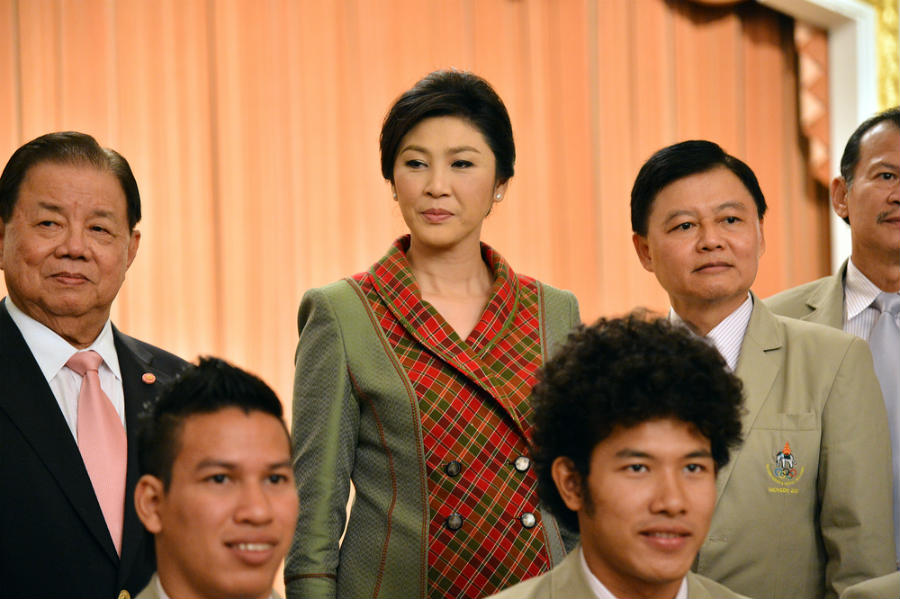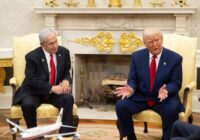While British and American officials are coming into conflict with the military, Thailand’s relationship with the EU has been hit.
With Thailand’s slow road back to democracy looking like it has no end in sight, the military junta led by former General Prayuth Chan-ocha is looking for ways to divert international attention from the country’s authoritarian turn.
Already under fire from human rights and civil society groups for detaining anti-corruption activists, torturing civilians in military detention, and driving its own top human trafficking investigator into exile in Australia, the “transitional” government has recently seen a spate of international incidents involving several of its most important partners, including both the United States and the European Union (EU).
Since overthrowing Yingluck Shinawatra’s democratically elected government in May 2014, the Thai junta has seen only mild repercussions from Washington. After the coup, the Obama administration temporarily suspended military aid but ultimately decided to take part in the “Cobra Gold” joint military exercises for fear of driving its longtime ally toward China. The US State Department also added Thailand to its “blacklist” of human trafficking violators in 2014 and declined to improve its standing in the 2015 report, but that has entailed little in the way of concrete repercussions. While the US may trying to minimize the impact of the coup on bilateral relations, officials in Thailand seem to be taking the opposite approach.
On December 9, 2015, Thai police announced they were investigating US Ambassador Glyn Davies for a speech he made at a Foreign Correspondents’ Club event in November. Speaking to international journalists present at the event, Davies expressed concern over prison sentences being handed down to civilians tried on lèse majesté charges by military courts. According to the investigation and the complaint that prompted it, to even bring up concerns over freedom of speech may itself be lèse majesté in Thailand’s tense political climate.
The US ambassador is protected from any official charges by diplomatic immunity, but that has not stopped a harsh reaction from groups who support the military government. Hard-line royalists in Thailand even staged a technically banned protest outside the US Embassy.
Davies is not the only Western envoy to find himself in hot water for offering even mild criticism of the junta’s behavior. British Ambassador Mark Kent drew a rebuke from government spokesmen for pointing out that a royalist protest was allowed while student activists were prevented from pursuing corruption allegations linked to the military.
In early 2015, US Assistant Secretary of State Daniel Russel also sparked the ire of Prayuth for suggesting the 2014 coup was “politically driven.”
Relations With the EU
While British and American officials are coming into conflict with the military government and its supporters, Thailand’s relations with the EU are also being impacted by political developments. As reported by NewEurope, the junta is now embroiled in a dispute with the European Parliament over its invitation to former Prime Minister Yingluck Shinawatra to address the parliament on Thailand’s political situation.
The Thai government reacted harshly, criticizing Elmar Brok, chairman of the Committee on Foreign Affairs, and Werner Langen, panel chair for relations with Southeast Asia and ASEAN, for not communicating through the Thai Ministry of Foreign Affairs and for not inviting the government to participate as well. The junta even suggested the invitation itself might be fake.
Brok and Langen, for their part, responded by confirming the authenticity of the invitation and their openness to the government’s participation. When the Thai leadership denied Yingluck—who is still awaiting trial—permission to travel to Europe, the two chairs declared themselves “surprised and deeply disappointed.”
Beyond diplomatic controversy, tensions between the EU and Thailand’s military rulers could ultimately have serious economic consequences. The European Parliament has already declared the 2014 coup “illegal,” and members of the European Parliament like Ryszard Czarnecki have argued for tying the trade relationship to Bangkok’s respect for human rights.
Those economic ties are of critical importance for Thailand, which sees over €30 billion in bilateral trade and receives over €10 billion in foreign direct investment from Europe. The EU has already threatened Thailand with a trade ban on its vital fishing industry if it doesn’t act to curtail slave labor and illegal fishing.
As Thailand’s autocratic interim government drags on, the likelihood of further disputes with the US, Britain and the EU could do serious damage to the country’s standing with its most important international partners.
Unfortunately, the political calculus that motivated both the coup and the delays in transitioning to civilian rule are likely to persist for the foreseeable future. The struggle between traditional Thai elites (who back Prayuth) and the long-marginalized rural electorate supporting Thaksin and Yingluck Shinawatra has been at the heart of Thailand’s political troubles for the past decades.
When the upcoming royal succession takes place, this tension could become more palpable than ever. By taking power and preventing elections until they have controlled the monarchical transition, the military and its allies aim to prevent the pro-Shinawatra electoral majority from interfering with their monopoly on power and influence. While protests from the Thai public and the international community remain (mostly) muted for now, it is an open question as to how long this seemingly peaceful status quo can last.
The views expressed in this article are the author’s own and do not necessarily reflect Fair Observer’s editorial policy.
Photo Credit: Prasit Rodphan / Almonfoto / Shutterstock.com
 We bring you perspectives from around the world. Help us to inform and educate. Your donation is tax-deductible. Join over 400 people to become a donor or you could choose to be a sponsor.
We bring you perspectives from around the world. Help us to inform and educate. Your donation is tax-deductible. Join over 400 people to become a donor or you could choose to be a sponsor.
Support Fair Observer
We rely on your support for our independence, diversity and quality.
For more than 10 years, Fair Observer has been free, fair and independent. No billionaire owns us, no advertisers control us. We are a reader-supported nonprofit. Unlike many other publications, we keep our content free for readers regardless of where they live or whether they can afford to pay. We have no paywalls and no ads.
In the post-truth era of fake news, echo chambers and filter bubbles, we publish a plurality of perspectives from around the world. Anyone can publish with us, but everyone goes through a rigorous editorial process. So, you get fact-checked, well-reasoned content instead of noise.
We publish 2,500+ voices from 90+ countries. We also conduct education and training programs
on subjects ranging from digital media and journalism to writing and critical thinking. This
doesn’t come cheap. Servers, editors, trainers and web developers cost
money.
Please consider supporting us on a regular basis as a recurring donor or a
sustaining member.
Will you support FO’s journalism?
We rely on your support for our independence, diversity and quality.







